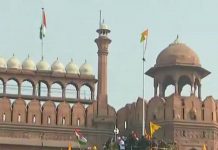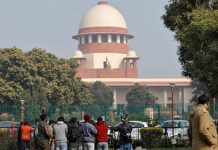
AN URDU couplet is always at hand as Ziauddin Siddiqui explains life’s small and big events. With a mien more Sufi than fundamentalist Islamist, the 46-yearold pharmacist in Maharashtra’s Aurangabad is unruffled as he slowly details the criminal cases against him, each more bizarre than the other. The case that takes the cake is the one in which Siddiqui and 95 others were implicated on December 6, 1999, when they held symbolic protests in the city to mark the seventh anniversary of the demolition of Ayodhya’s Babri Masjid at the hands of Hindu zealots in 1992.
That day in 1999, about a hundred activists belonging to a local organisation called the Muslim Action Committee gathered at a city square in Aurangabad and, as in every year since 1992, courted arrest. Around the same time, an equal number of activists from the local Samajwadi Party unit, which always has an eye on the Muslim vote, did likewise on the same issue. Both sets of protestors were taken and held together in a stadium ground next to the police headquarter.
As per practise, all of them would have been let off after some paperwork. But there was some altercation and the police and the protestors clashed. The police fired. One protestor died. Ninetysix were very badly injured.
So badly injured were they, in fact, that the whole event spun out of the administration’s control. Siddiqui suffered grievous injuries on his spine, face, nose, eyes and ears. When the government hospital couldn’t treat him and others similarly injured, they were sent to the KEM Hospital in Mumbai. A letter from the government hospital’s medical officer to the Mumbai hospital said, “The government has assured treatment free of charge”. The government also announced payments of Rs 10,000 to each of the injured. It also appointed AD Mane, a retired High Court judge, to head a commission of inquiry into the event. Justice Mane’s report blasted the police for using excessive force against the protestors who had courted arrest. He suggested that the police be sensitised to human rights. The state government accepted his findings and issued an Action Taken Report, which absolved the protesting outfits of blame.
Yet, the police filed a case against 96 people for their December 6, 1999 protest, and accused them of sedition, rioting, calling an unlawful assembly, assaulting a public servant, endangering public safety, and even “mischief by fire or explosive substance with intent to cause damage to the amount of one hundred rupees”.
ALL THOSE injured and given Rs 10,000 as compensation were also implicated. But that is not all. In the nine years since the incident and the alleged crime, no chargesheet has been filed. No charges have been framed. So, the trial hasn’t begun. Some 29 accused are on bail. The rest are shown as absconding. “They broke my nose and I lost my sense of smell forever,” Siddiqui recalled in an interview with TEHELKA in Aurangabad. He can barely see with his left eye.
Siddiqui was SIMI’s all-India general secretary from 1984-92, and had retired at the end of that tenure upon turning 30. Of course, once the police decided that Siddiqui was a SIMI member — even though he had left it in 1992 — there was no stopping them. In March 2001, the second criminal case against him was registered. Following an incident of burning of the Quran in New Delhi, public protests were called in Aurangabad by a federal body of Muslim organisations. Midway, the protest had turned violent, and the police had fired. No one was killed, none injured. SIMI hadn’t yet been banned so its office- bearers issued a press release criticising the police for the firing. The police retaliated by filing a case against SIMI alleging it called that protest, and arrested 10 people including Siddiqui. Once again, the accusations were the same as in the December 1999 case; in addition, they were also accused of hatching a criminal conspiracy. They were let off on bail after three days. Seven years later, the judge is yet to accept the chargesheet and start the trial.
On the day SIMI was banned on September 27, 2001, Siddiqui was picked up from home. “I phoned the police officer to ask why but he said he just wanted to talk with me.” When he went there, Siddiqui was arrested and had to spend the night in the lock-up; he got bail the next day. He was accused of inciting people to violence to protest the ban. After six long years, the charges in that case were framed only earlier this summer. “God knows when the trial will begin,” Siddiqui says. He is also implicated in the mother of all SIMI cases, the Surat Case, which is detailed in another column.













